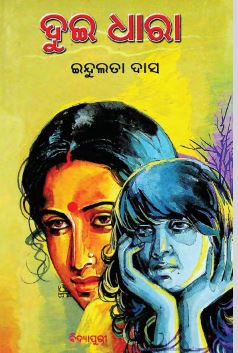Dui Dhara, a remarkable Odia novel penned by Indulata Das and published in 2002, is a poignant exploration of the multifaceted nature of human emotions, relationships, and social intricacies. The title, which translates to “Two Streams,” aptly captures the essence of duality that runs through the narrative—be it in the lives of the protagonists or the societal contexts they navigate. This work stands out not only for its storytelling but also for its deep-rooted social commentary.
At the heart of “Dui Dhara” lies the tale of two central characters whose lives are interwoven yet distinct, mirroring the two streams of existence. Through their journeys, Das delves into themes of love, sacrifice, betrayal, and resilience. The characters are meticulously crafted, each embodying a unique set of traits that reflect the diverse tapestry of society. The author goes beyond mere plot development; she paints a vivid picture of the emotional struggles and moral dilemmas that define human experience.
One of the novel’s significant strengths is its exploration of societal norms and expectations. Das skillfully critiques the rigid structures that often constrain individual freedom, particularly concerning gender roles. The female protagonist serves as a powerful representation of women’s struggles in a patriarchal society. Her inner conflict between personal desires and societal responsibilities resonates deeply with readers, both in the Odia cultural context and universally. This reflection on gender issues adds depth to the narrative, prompting readers to question and reflect on their perceptions of traditional roles.
In “Dui Dhara,” the emotional landscape is beautifully depicted through evocative language and imagery. Das’s writing is rich and lyrical, drawing readers into the characters’ world. She has a unique ability to capture fleeting moments of joy and sorrow, making the readers feel the weight of her characters’ experiences. This emotional authenticity fosters a strong connection between the readers and the characters, leading to moments of profound empathy.
Moreover, the setting plays a crucial role in the novel. Das roots her story in the cultural heritage of Odisha, seamlessly weaving in local traditions, festivals, and landscapes. This grounding in place not only enriches the narrative but also reinforces the social issues the characters face. Readers are transported to the heart of Odisha, experiencing the vibrant customs and struggles of its people, thereby fostering a deeper understanding of the societal backdrop against which the personal dramas unfold.
“Dui Dhara” is not merely a tale of individual struggles; it is a reflection of collective consciousness. The novel invites readers to engage in a dialogue about love, loss, and the quest for identity in a rapidly changing world. Indulata Das’s work is a celebration of resilience, emphasizing that even in the face of adversity, there is a path toward understanding and reconciliation.
In conclusion, “Dui Dhara” is a quintessential work that holds a mirror to society, urging us to reflect on the complexities of human relationships and the socio-cultural fabric that shapes our lives. Indulata Das has created a narrative that is both timeless and relevant, making it an essential read for anyone interested in exploring the depths of human emotion through the lens of Odia literature. This novel is not only a story; it is an experience that lingers long after the last page is turned, prompting readers to contemplate their own “two streams” in life.
Books Info
| Books name | Dui Dhara/ଦୁଇ ଧାରା |
| Author | Indulata Das |
| No Of pages | 65 |
| Publisher | Vidyapuri |
| Publication | 2002 |
| Printed At | Royal Halfton Co |
| Distributor | NA |

